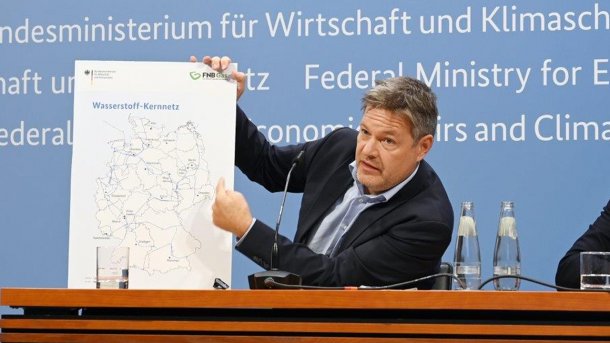Hydrogen core network: 9700 km of pipelines applied for
The German transmission system operators have submitted their application for a hydrogen core network to the Federal Network Agency. The project

Federal Minister for Economic Affairs Robert Habeck presented the plan for the hydrogen core network in November 2023.
(Image: BMWK / Susanne Eriksson)
The hydrogen core network planned by the German government is slowly getting underway. According to the Federal Network Agency, the joint application (PDF) of the transmission system operators for 9666 km of pipelines has now been submitted. Of these, 60 percent are those that will be converted from natural gas, according to a statement from the agency. It intends to process the application within two months and submit it for consultation. The first pipelines are due to go into operation next year.
The core network pipelines are to be put into operation gradually, if possible by 2032. For the German government, the grid is a key infrastructure project for the energy transition. It is intended to connect the main areas of hydrogen consumption and production as well as storage and import points. According to the transmission system operators, the investment costs amount to 19.7 billion euros. The feed-in and feed-out capacities are to be around 100 GW and 87 GW respectively.
Majority to come from imports
The project will connect all German states and hydrogen can be imported by pipeline at an early stage via border crossing points, explains the Federal Ministry of Economics. In future, Germany will cover a large part of its hydrogen requirements via imports by pipeline or ship. Geographically, the focus of pipeline-based imports is on the North Sea, Baltic Sea and Mediterranean region, with possible production centers on the Iberian Peninsula and in North Africa. However, Nicole Hoffmeister-Kraut (CDU), Baden-Württemberg's Minister of Economic Affairs, criticized in the Bundesrat in December that large parts of her federal state were not intended to be connected to the core network.
In April of this year, the federal government agreed on the financial structure and a timetable for the hydrogen core network. According to this, projects that are to be put into operation by December 31, 2037 are also to be considered for the project. The Bundestag passed the legal basis in November 2023. The EU Commission approved the subsidies for the hydrogen core network in June.
Videos by heise
The core network is not intended to be the final expansion stage. A network development plan for gas and hydrogen is to be approved by the Federal Network Agency for the first time in 2026. The planning for gas and hydrogen is intended to serve the demand-oriented further development of the core grid, writes the Federal Ministry for Economic Affairs and Energy.
The Federal Network Agency will set the ramp-up fee in the second half of 2024, the transmission system operators explain. In addition, it still needs to be determined how the funds will be financed and made available. The market model for hydrogen, including the marketing of transport capacities, also still needs to be regulated. "In addition, future market roles such as storage, especially in the market ramp-up phase, have not yet been clarified."
(anw)